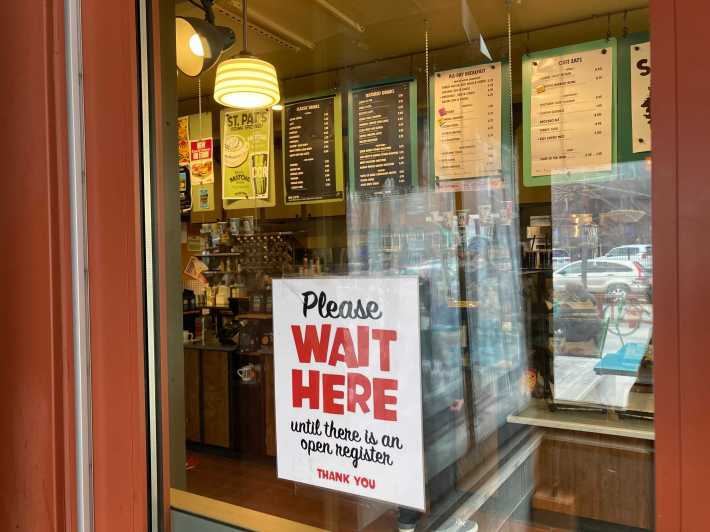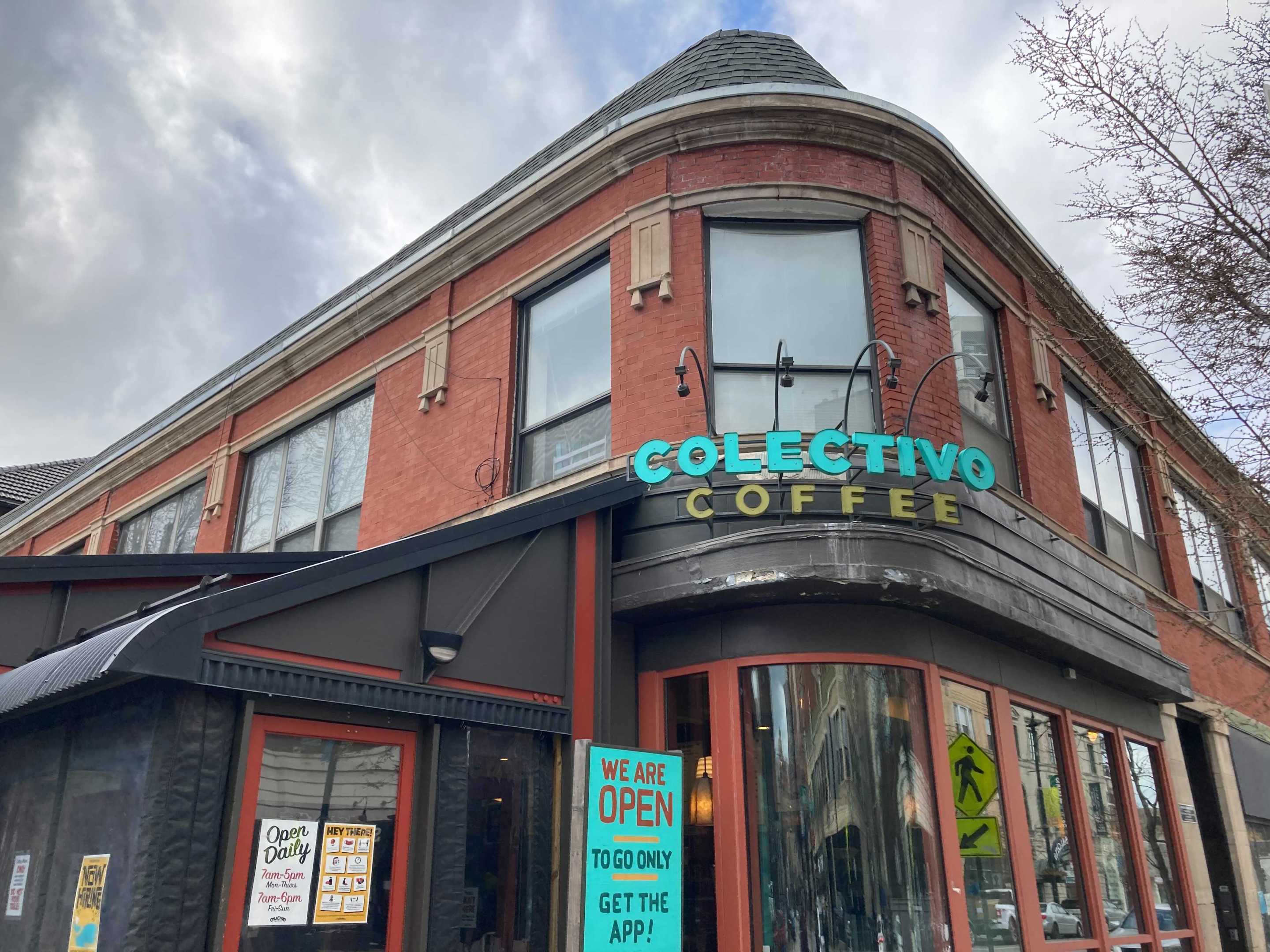In early January, one of three owners of Colectivo Coffee, a cafe and bakery chain in the Midwest, sent a video message to staffers as part of the regular internal company newsletter. In the video, Lincoln Fowler, who along with the other co-owners (his brother Ward Fowler and Paul Miller), has been fighting against employees’ efforts to unionize since last summer, discussed the pro-Trump mob who attacked the United States Capitol on January 6, saying he wanted to express “sadness for the events that occurred in Washington D.C. this past Wednesday.”
“Those events are a stark reminder that all of us need to think of ourselves as one nation, one community and at the most fundamental level, understand we are bound by a common set of rules and ideas that form us into that nation, and into that community,” Fowler said. “I think in some ways it’s important to reflect that Colectivo is something similar. Our company is one company, and we need to think of ourselves as one group of people, with one mission and one goal.”
Devoid of context, the sermon is forgettable, just empty platitudes. But the words take on new meaning against the backdrop of the escalating union fight, in which the company’s owners have paid for the services of a union-busting firm called the Labor Relations Institute despite telling staff that the business was in dire business straits; terminated at least one vocal union organizer; banned employees from wearing pro-union masks while working; and blasted out anti-union emails to workers that, among other things, questioned the integrity of union organizers.
“[It] was pretty upsetting that it seemed like he was comparing our unionization effort and the conflict caused by [management] bringing in the LRI and mounting a strong anti-union campaign to the insurrection at the Capitol,” Kait Dessoffy, a Colectivo shift lead in Chicago, told Defector earlier this month. “And tying that into national unity versus Colectivo unity seems like a really underhanded way to devalue the legitimate concerns of the workers who are exercising our federal right to unionize.”
This month, workers are doing just that: Around 350 baristas, warehouse roasters, delivery drivers, and bakery workers, working in more than a dozen shops in three cities—Milwaukee, Chicago, and Madison—are in the process of voting with the National Labor Relations Board on whether to form what would be the largest unionized coffee chain in the country. Their votes will be cast, but only after enduring a long and shameless anti-union campaign launched by Colectivo management.
Colectivo workers first started organizing more than a year ago, in the hopes of securing a voice in an increasingly corporate workplace, better wages, safety protections during the COVID-19 pandemic, humane scheduling, and more communication with management. They publicly announced the union, affiliated with IBEW, in August, and began circulating and signing union authorization cards. Initially, they were hopeful that management would not stand in the way of workers forming a union. Zoe Muellner, a former Colectivo trainer and union organizer based in Chicago, said the company didn’t immediately respond to the announcement of the union.
“It was two weeks before they sent out their first letter. So we were wondering, Oh, maybe they just won't say anything at all, maybe they will remain neutral,” Muellner said, adding that organizers hoped it would be an “unbiased” process. “That changed when the letters started coming out, for sure.”

Management sent the first letter to employees in late August. In the four-page note, which was first reported by local news sites including Urban Milwaukee, and later obtained by Defector, the company’s CEO Dan Hurdle explained that he and the three owners “strongly oppose the unionization efforts, for the good of our company and our culture.” The letter repeatedly burnished the company’s reputation as a “deeply progressive organization,” while trotting out standard anti-union talking points:
“Ward, Paul, Lincoln, and I fear that a union would have a profoundly negative impact on our company Culture. Camaraderie and respect would be replaced by workplace rules. We’ve been on a lot of construction sites; please reflect for a moment as to whether that is the culture you want to work in at Colectivo. A unionized work environment would change and undermine what’s most special about Colectivo – our close and collaborative relationship with our co-workers. And at a time when we need ‘all hands pulling in the same direction’ to get through these difficult times, we think that introducing a third-party union into our relationship would have the opposite effect!”
Colectivo CEO Dan Hurdle
The letter also described how the COVID-19 pandemic had plunged the business into financial uncertainty: “Colectivo is trending in the right direction, but companywide sales are still only 60% compared to the same period last year. Colectivo has been actively losing money since the shutdown in March.” Hurdle’s letter didn’t explicitly mention that Colectivo had received $3.5 million in federal money as part of the Paycheck Protection Program, but it did disclose that “we have been and will continue to borrow money from lenders.”
In response to a series of specific questions from Defector, Colectivo sent a statement, part of which attempted to clarify its anti-union position. The statement said company leadership is not against workers unionizing; it’s against its own workers unionizing.
“We want to be clear that as people with progressive values, we are not against the right to organize, and we are not anti-union," the statement read. "However, we do believe very strongly that this union, the International Brotherhood of Electrical Workers, will not solve the challenges of this company and will not make our co-workers Colectivo experience better.” (The full statement is included at the end of this piece.)
Around the time that management sent the letter laying out its opposition to unionization, the union organizers set up Colectivo Collective, an Instagram account to help keep both workers and the public informed about the unionization effort. The account featured testimonies from employees, messages countering the company’s union-busting rhetoric, and celebrations of endorsements from various local elected officials. (The union also has a website where it posts updates and some communication to and from Colectivo management.)
Muellner said the union announcement, coupled with management’s opposition, made for some uncomfortable dynamics at work.
“You could definitely tell that the relationships had changed. The first day after we had sent the [Volunteer Organizing Committee] letter, all of a sudden, our district manager stopped making eye contact with me,” they said. “And I had to be kind of overly nice and initiate all of our conversations and keep it super light and fun, because I could tell that there was weird tension.”
By October, the company had hired LRI, whose website touts that it spends “every day [...] educating employees somewhere about the disadvantages of unions.” LRI consultants rented out theater space to hold what are known as “captive audience meetings,” in which they ostensibly presented workers with neutral information about unionizing. According to the Colectivo workers who spoke to Defector, workers known to management as members of the union organizing committee were not invited to attend these meetings, while the rest of employees were paid to do so.
“They rented a movie theater to get every coworker in Chicago to go talk or to listen to what this [LRI] guy had to say,” Ryan Coffel, a shift lead in one of the Chicago cafes, said. “Except for the public members of the organizing committee. We were banned from the meetings with the direction that the company already knows where you stand, so you don't need to be in these meetings.”
In its statement to Defector, the company said it had no choice but to “turn to professionals who specialize in the law to ensure the company and its co-workers are fully informed.” The statement continued:
Like anything, there is a cost for this professional expertise, but we see it as an investment to ensure our co-workers are informed in the decision they are faced with, and that the election is conducted fairly. Colectivo would much rather be spending these funds on wages, equipment, tools and improvements to systems, but this wasn’t our choice.
After hiring professional union-busters, the efforts to crack down on the organizing activity escalated. In mid-October, as Eater reported at the time, Colectivo closed two cafes, canceled a bakery project, and laid off employees. One of those employees was Muellner.
“I remember because it was a week after my 30th birthday,” they said, recalling that they were mostly concerned for coworkers who worked at the cafes that had been closed. “I was worried about their safety, their longevity, how they are going to be able to pay for bills. It hadn't hit me that like, oh, maybe this is foreboding that something's gonna happen to me, too.”
When a newly hired human resources representative told Muellner that their trainer position was being eliminated, Muellner was “taken aback." Just two weeks before, Muellner said, Muellner's boss had been “game planning” their future role in the training department. “I was like, great, there's a plan for me to be here for a while,” Muellner told Defector.
Muellner said that they “100 percent” think that their role as a vocal union organizer played a part in their being laid off. “I had never really received a bad mark or a bad review,” they said. “It came as a total surprise.” In its statement, Colectivo did not deny that it had targeted Muellner for being a union organizer.
The IBEW filed an unfair labor practice grievance on Muellner’s behalf, one of several filed on behalf of Colectivo workers, according to John Rizzo of IBEW Local 1220 in Chicago. Muellner is waiting to see how the company will handle it and if it Colectivo will rehire them. After Muellner was terminated, IBEW hired Muellner part-time to continue working on the campaign, which management continued to try and squash.
“There was a point when we made ‘IBEW Strong’ face masks,” Muellner said. “Before that time, it was totally fine to wear masks that had any words or verbiage on them. But as soon as those masks came out, all of a sudden, there was a change in policy about not being able to wear anything that had wording or branding that wasn't Colectivo’s.” In its statement, Colectivo did not deny the characterization of this policy change.
On February 3, after the company had declined to voluntarily recognize the union, Colectivo filed for the election with the National Labor Relations Board. As the voting neared, the union received statements of support from multiple elected officials. On March 8, Senators Tammy Duckworth, Richard Durbin, and Tammy Baldwin wrote a letter to the Colectivo workers stating their support for “the right of workers to organize and establish an open and equal organizing process.” The letter “urge[d] Colectivo to respect that process.” More Perfect Union, a progressive media organization, produced a video about Colectivo’s efforts.
NEW: @ColectivoCoffee could soon be the largest unionized coffee chain in the U.S.
— More Perfect Union (@MorePerfectUS) March 12, 2021
Workers just began voting on a union that would bring together baristas, bakery workers, delivery drivers, & more.
But management is going all out to stop them. pic.twitter.com/sBHhsu9IRw
As support for the union ramped up, so too did the company’s efforts to counter it. Before the ballots went out on March 9, Dessoffy said, management pulled out all the stops.
“It was like an anti-union spirit week,” Dessoffy said. “We knew it was coming. There was a barrage of emails, I had a town hall and a union-busting meeting two days apart.”
One of the emails took aim at the union organizers themselves, insinuating that employees couldn’t trust the organizing committee, as nearly half of the members who made up the original committee were no longer at the company. The email included what Muellner called a “very dramatic” infographic illustrating the point.
“We kind of took that personally. That our owners and our CEO are punching down to minimum-wage workers,” Coffel said. “And what they failed to say is [who was] fired. Colectivo terminated these people, after finding out that they were a part of the organizing committee, or didn't ask them to come back from furlough. There's at least one person out there that had to quit because their hours went from working 40 hours a week to working 15. I mean, Chicago rents, there's no way you can live and survive on 15 hours.” In its statement, Colectivo declined to comment on which union organizers were terminated or otherwise forced to look for work elsewhere.
Meanwhile, the owners also embarked on a listening tour of sorts, visiting the cafes and meeting face-to-face with workers. “They told us they were eager to listen,” Dessoffy said. “And we said, ‘Okay, we're eager to talk.’”
Rizzo, the IBEW Local 1220 rep, said the union can help ensure management actually listens.
“IBEW has created quarterly labor management meetings where we sit down and have conversations with management and the workers. We say this is what’s working, this is what’s not working,” he said. “It’s not a bitch session, it’s a back-and-forth development of ideas.”
Though there isn’t much precedent for a unionized chain of cafes or restaurants in the U.S., especially one spread across three cities in two states, recent efforts have served as blueprints for Colectivo organizers. Several workers who spoke to Defector pointed to SPoT Coffee workers in Rochester and Buffalo, who in 2019 overwhelmingly voted to unionize with Workers United, an affiliate of Service Employees International Union. In 2017, Gimme Coffee workers in Ithaca voted to unionize and ratified their first contract in 2018. And in August of 2020, workers at a Starbucks in Toronto, Canada, overworked and underprotected amid the pandemic, voted to unionize with the United Steelworkers. But there have been setbacks too. In 2019, workers at a Wisconsin cafe chain called Stone Creek Coffee voted not to unionize, following strong union opposition from the owners.
Historically, it’s been difficult to organize cafes, restaurants, and other types of service work, due to high turnover rates, laws that have made it more difficult to unionize, and outdated notions of what types of workers can be in a union. But as Eater reported in 2019, more and more service workers are fighting to unionize to secure better wages, safety protections, and basic respect. The pandemic highlighted the essential labor of these workers and kicked some organizing efforts, like the one at Colectivo, into overdrive. Though Colectivo workers and organizers feel optimistic about the vote, which closes at the end of the month, and what it would mean for Colectivo workers to have a voice in the company, they’re also taking a wider view.
“I believe at the time [SPoT Coffee] unionized, they were the biggest coffee union in the United States. And something that they said was like, We are the biggest right now. But we can't wait for other people to break our record,’” Muellner said. “And I think that that's something that we look at as an aspirational goal. If we could be the next group after that, and then somebody else could be the next group after that, we're just going to keep raising the standards, and eventually help lift up the entire coffee community. And not only the coffee community, but then the service industry at large.”

Full statement from Colectivo to Defector:
As we reflect on 2020, the magnitude of the challenges is still shocking. Many companies in the industry failed. And while Colectivo did not, we will be the first to acknowledge that we did not do everything perfectly - or even well - in the chaos of a global pandemic and parallel social justice movement.
It is at times like this that we need to dig deep and rely upon our core values - specifically our goal of continuous improvement - to help us get back to that special place and spirit that is inherent in the Colectivo culture.
2020 was about survival - and our co-workers helped us do that with quick pivots and adaptations. Our people, our products and our customer experience have all allowed Colectivo to survive. What we created as a team allowed us to survive. We did have to close several cafes, and as a result, cut hours drastically which did result in layos. Our revenue dropped approximately 40%.
As part of this organization, our co-workers have gotten to know us as people. It is quite likely that we share progressive values. It is quite likely that they were drawn to our deep passion for the communities in which we live and plant roots. It is quite likely that they share in our desire to support local businesses, vendors and neighbors. We want to be clear that as people with progressive values, we are not against the right to organize, and we are not anti-union. However, we do believe very strongly that this union, the International Brotherhood of Electrical Workers, will not solve the challenges of this company and will not make our co-workers Colectivo experience better.
We and our and leadership team recognize the complexity of the National Labor Relations Act (NLRA) and turned to professionals who specialize in the law to ensure the company and its co-workers are fully informed.
Like anything, there is a cost for this professional expertise, but we see it as an investment to ensure our co-workers are informed in the decision they are faced with, and that the election is conducted fairly.
Colectivo would much rather be spending these funds on wages, equipment, tools and improvements to systems, but this wasn’t our choice. We are responding in the most responsible way we know how and want to oer resources to our co-workers to make an informed decision.






